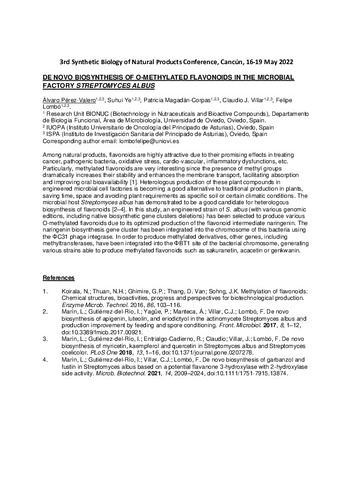De novo biosynthesis of o-methylated flavonoids in the microbial factory streptomyces albus
Autor(es) y otros:
Palabra(s) clave:
Poster
Fecha de publicación:
Editorial:
Fusion Conferences
Resumen:
Among natural products, flavonoids are highly attractive due to their promising effects in treating cancer, pathogenic bacteria, oxidative stress, cardio-vascular, inflammatory dysfunctions, etc. Particularly, methylated flavonoids are very interesting since the presence of methyl groups dramatically increases their stability and enhances the membrane transport, facilitating absorption and improving oral bioavailability [1]. Heterologous production of these plant compounds in engineered microbial cell factories is becoming a good alternative to traditional production in plants, saving time, space and avoiding plant requirements as specific soil or certain climatic conditions. The microbial host Streptomyces albus has demonstrated to be a good candidate for heterologous biosynthesis of flavonoids [2–4]. In this study, an engineered strain of S. albus (with various genomic editions, including native biosynthetic gene clusters deletions) has been selected to produce various O-methylated flavonoids due to its optimized production of the flavonoid intermediate naringenin. The naringenin biosynthesis gene cluster has been integrated into the chromosome of this bacteria using the ΦC31 phage integrase. In order to produce methylated derivatives, other genes, including methyltransferases, have been integrated into the ΦBT1 site of the bacterial chromosome, generating various strains able to produce methylated flavonoids such as sakuranetin, acacetin or genkwanin.
Among natural products, flavonoids are highly attractive due to their promising effects in treating cancer, pathogenic bacteria, oxidative stress, cardio-vascular, inflammatory dysfunctions, etc. Particularly, methylated flavonoids are very interesting since the presence of methyl groups dramatically increases their stability and enhances the membrane transport, facilitating absorption and improving oral bioavailability [1]. Heterologous production of these plant compounds in engineered microbial cell factories is becoming a good alternative to traditional production in plants, saving time, space and avoiding plant requirements as specific soil or certain climatic conditions. The microbial host Streptomyces albus has demonstrated to be a good candidate for heterologous biosynthesis of flavonoids [2–4]. In this study, an engineered strain of S. albus (with various genomic editions, including native biosynthetic gene clusters deletions) has been selected to produce various O-methylated flavonoids due to its optimized production of the flavonoid intermediate naringenin. The naringenin biosynthesis gene cluster has been integrated into the chromosome of this bacteria using the ΦC31 phage integrase. In order to produce methylated derivatives, other genes, including methyltransferases, have been integrated into the ΦBT1 site of the bacterial chromosome, generating various strains able to produce methylated flavonoids such as sakuranetin, acacetin or genkwanin.
Descripción:
Synthetic Biology of Natural Products Conference (3rd. 2022. Cancún, México)
Colecciones
- Biología Funcional [792]
- Pósteres [94]
Ficheros en el ítem





